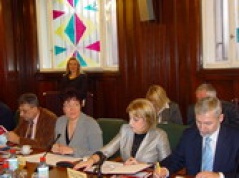National Assembly of the Republic of Serbia / Activities / Activity details

10 December 2009 Participants of the public hearing
Thursday, 10 December 2009
Public Hearing Held on Apatridy and Poverty in Serbia
With the support of UNHCR and UNDP, the National Assembly Committees on Poverty Reduction, on Labour, Ex-Servicemen’s and Social Issues and on Interethnic Relations held a joint sitting in the form of a public hearing on “Apatridy and Poverty in Serbia”.
With the support of UNHCR and UNDP, the National Assembly Committees on Poverty Reduction, on Labour, Ex-Servicemen’s and Social Issues and on Interethnic Relations held a joint sitting in the form of a public hearing on “Apatridy and Poverty in
At the beginning of the joint sitting, the participants were addressed by the National Assembly Speaker, Prof. Dr Slavica Djukic-Dejanovic. In her address, the Assembly Speaker stressed that the problem of apatridy most often came up in connection with human and minority rights issues. She stressed that today’s gathering expresses the National Assembly’s determination to approach the problem in a comprehensive way. The data show that at least 17 thousand people in
Eduardo Arboleda, UNHCR Representative in
Chairman of the Committee on Interethnic Relations Miletic Mihajlovic pointed out that apatridy is also a problem for the achievement of ethnic minority rights and pledged the Committee’s full support to the solution of the problem.
Chairman of the Committee on Labour, Ex-Servicemen’s and Social Issues Meho Omerovic said that the Committee would work on changing the existing laws, within its purview and via the competent ministry, so as to make the life of these persons more bearable. He announced the adoption of a new Law on Social Protection that would define the provision of urgent intervention services for apatrides until they realise their right to citizenship, after which they would be able to enjoy other measures of state protection as well. According to this solution, in addition to the citizens of the
Representatives of organisation PRAXIS and Centre for the Improvement of Legal Studies also addressed the gathering, presenting their activities in the sphere of apatridy.
In addition to the deputies, representatives of the Ministry of Human and Minority Rights, Interior, Labour and Social Policy, Office of the National Security Council, non-governmental sector and international organisations also took part in the public debate. In the discussion, the participants pointed out that there are no adequate mechanisms for the protection of stateless persons, primarily mechanisms for their identifications, that the issue of apatridy is connected with the problem of poverty and crime which can be issues of national and regional security, adding that the problem should be addressed proactively and not repressively. The issues or readmission and visa liberalisation in relation to apatridy were also discussed, as well as cooperation of the non-governmental sector, international organisations and ministries in charge of the issue.
Summarising the results of the discussion, Plavsic stated that the participants agreed that there were no political or legal obstacles to adopting a law that would provide a systemic solution to the problem and deemed that in the process of passing such an important law all the participants should work in partnership.
Committees related to this activity
- Poverty Reduction Committee
- Committee on Labour, Ex-Servicemen's and Social Issues
- Committee on Inter-Ethnic Relations




